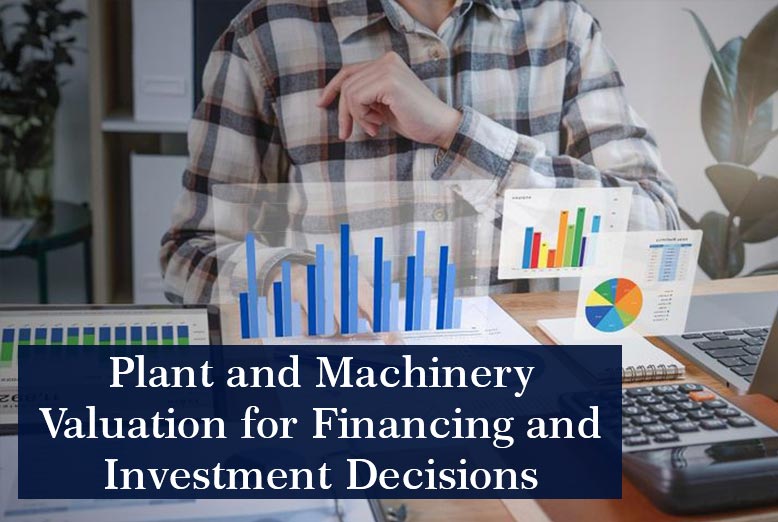Valuing plant and machinery is crucial for financing and investment decisions. Accurate valuation helps businesses secure loans, attract investors, and make informed financial decisions. This process involves assessing the worth of physical assets, which can be complex but essential for economic stability and growth.
This article explores the importance of plant and machinery valuationin financing and investment decisions, the methods and challenges involved, and the impact on financial decision-making.
Why Accurate Plant and Machinery Valuation Matters
Accurate valuation of plant and machinery ensures fair financial representation. Banks and financial institutions require precise asset valuation to grant loans. Investors rely on these valuations to assess potential returns and risks. Overvalued assets can lead to financial losses, while undervalued assets might result in missed opportunities.
Valuation for Financing
Plants and machinery often serve as collateral for loans. Accurate valuation ensures the collateral covers the loan amount. Overvaluation may lead to inadequate collateral, while undervaluation might result in lower loan amounts.
Lenders set interest rates by evaluating asset values. Higher-valued assets often attract lower interest rates, reducing borrowing costs. Accurate valuation also helps negotiate favourable loan terms.
Valuation for Investment Decisions
Valuation provides a clear picture of asset worth. Investors use this information to evaluate investment opportunities. Accurate valuation ensures realistic expectations and informed decision-making.
Plant and machinery valuation is also crucial in mergers and acquisitions. Accurate valuation helps determine fair purchase prices and ensures both parties clearly understand the asset’s worth.
Methods of Valuation
Several methods are used to value plants and machinery. Each method has its advantages and is chosen based on the asset type, industry, and purpose of valuation.
Cost Approach
The cost approach calculates the value based on the cost of replacing the asset. This method considers the current price of similar new assets, subtracting depreciation. It is useful for new or unique assets where market data is limited.
Market Approach
The market approach determines value by comparing similar assets sold recently. This method is effective when there is an active market for the asset. It provides a realistic estimate based on actual market transactions.
Income Approach
The income approach values assets based on the income they generate. This method estimates future cash flows and discounts them to present value. It is suitable for income-generating machinery and plants with predictable earnings.
What Factors Affect Valuation?
Several factors influence the valuation of plants and machinery. Understanding these factors helps in making accurate assessments.
Age and Condition
The age and condition of assets significantly impact their value. Newer and well-maintained machinery generally has a higher value. Regular maintenance and timely upgrades preserve asset value over time.
Technological Advancements
Technological advancements can quickly render machinery obsolete. Valuation must consider current technology trends. Even if in good condition, outdated machinery may have lower value.
Market Demand
Market demand for specific machinery affects its value. High demand increases value, while low demand decreases it. Economic conditions and industry trends also play a role in determining market demand.
Regulatory Compliance
Compliance with regulations and standards is crucial. Non-compliant machinery may face operational restrictions, reducing its value. Ensuring assets meet industry standards maintains their market value.
Some Challenges in Plant and Machinery Valuation
Valuing plant and machinery comes with challenges. Overcoming these challenges ensures accurate and reliable valuations.
Lack of Market Data
Limited market data can hinder accurate valuation. Unique or specialised machinery may not have comparable sales data. In such cases, expert appraisers and alternative methods are necessary.
Subjectivity
Valuation involves subjective judgments. Different appraisers might arrive at different values. Standardised methods and clear guidelines reduce subjectivity and enhance accuracy.
Rapid Technological Changes
Rapid technological changes affect asset values quickly. Regular updates and market analysis are essential to maintain accurate valuations.
Empower Your Business with Reliable Plant and Machinery Valuation Services
Accurate valuation of plant and machinery is vital for financing and investment decisions. Understanding various valuation methods and factors ensures reliable assessments.
Businesses can accurately determine the true value of their plants and machinery by engaging a reputed company valuation firm like RNC. With a team of certified appraisers, technical expertise, and a keen eye on market trends, they help their clients gain a competitive advantage.
The best business valuation experts in town also provide comprehensive plant and machinery valuation services across various sectors. Based on client needs, experts accurately assess plant and machinery, ensuring compliance with legal and tax regulations and enhancing internal decision-making processes.
Also Read: The Importance of Financial Management within a Business




















